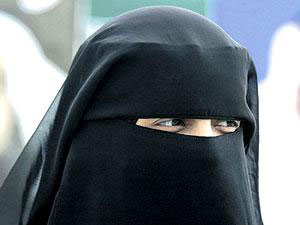One day after a French parliamentary commission presented a report on banning the Islamic face and full-body veils from public services, there was uncertainty Wednesday concerning what steps lawmakers will take, DPA reported.
The report by the bipartisan 32-member commission stopped well short of an outright ban on the burqa and the niqab, which many politicians from President Nicolas Sarkozy's conservative UMP party had called for.
Instead, the report proposed directives and new regulations to make it illegal for anyone to use public services, such as a hospital, bus or school, with his or her face covered.
The report also proposed going before the government's highest administrative court, the Council of State, to ask about the legality of a possible law banning face veils in public areas.
In 2008, the Council of State had ruled that wearing the burqa represents "a radical religious practise (that is) incompatible with the essential values of the French community, notably the equality of the sexes."
According to many observers, commission members were apparently fearful that a law banning the veil outright would run afoul of the French Constitutional Council, the country's highest constitutional authority, and the European Court of Human Rights.
Many conservative law-makers expressed dismay at what they called the commission's timid conclusions. They are now pinning their hopes on a bill by the head of the UMP parliamentary group, Jean-Francois Cope, which will seek to ban the burqa and niqab in all public areas.
"If we don't ban (the full-body veil) in all public spaces, it could convey the feeling that it is authorized in certain places," Cope said Tuesday. He said the bill would be examined in March, after the second round of regional elections, to be held on March 21.
If such a law were to be passed, it would make France the first country to outlaw Islamic veils. In 2004, France banned the wearing of Islamic headscarves, as well as other blatant religious symbols, in public schools.
An estimated 5 million Muslims live in France. Fewer than 2,000 women are believed to wear the burqa and niqab.
The move to outlaw the veils has provoked some criticism abroad. In a withering editorial the New York Times on Wednesday blasted French lawmakers, saying that "the Taliban would be pleased" by a ban.
Accusing Sarkozy and his political allies of using what it called "Muslim-bashing" to lure right-wing-extremist voters from the National Front of Jean-Marie Le Pen, the daily wrote, "No political gain can justify hate-mongering."






